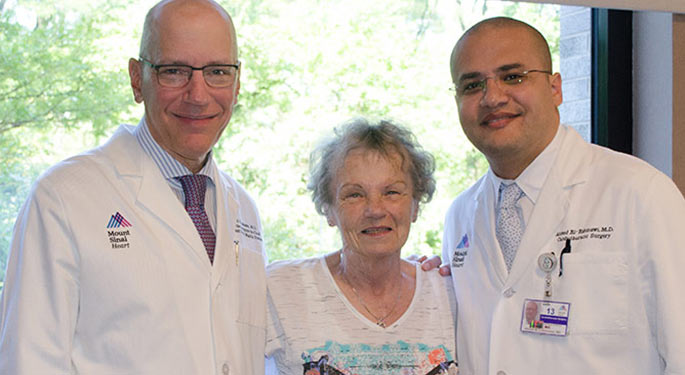Mitral Valve Disease and Surgery

The Mitral Valve Repair Center at the Mount Sinai Health System is a national leader in mitral valve repair surgery. The superiority of mitral valve repair over replacement with a mechanical or bioprosthetic valve is now well established. The Mitral Valve Repair Reference Center offers patients one of the highest percentages of successful valve repair anywhere in the world.
The overt operative and short-term clinical superiority of mitral valve repair over replacement with a prosthetic valve is well established and accepted by most cardiac specialists. As a result, most research efforts have focused on the long-term durability of mitral valve repair, particularly important in younger patients with degenerative mitral valve disease. We have had great success with patients with mitral valve prolapse; our repair rate is nearly 100 percent for patients with degenerative mitral valve disease. We also have mitral valve repair expertise for patients with advanced cardiomyopathy. If you have associated atrial fibrillation, we offer the latest in concomitant arrhythmia surgery, including the MAZE procedure. We can also perform mitral valve repair with minimally invasive approaches, when appropriate.
Types of Mitral Valve Disease
There are two types of mitral valve disease including mitral regurgitation, and mitral stenosis.
Mitral Regurgitation
Mitral regurgitation, also known as mitral incompetence or mitral insufficiency, is a valvular heart disease in which one of the heart valves fails to close properly, causing blood to leak through the opening and go in the wrong direction. If you have a history of rheumatic fever, coronary artery disease, or a hereditary connective tissue disorder, such as Marfan syndrome, you are at increased risk of mitral regurgitation. Mitral regurgitation can lead to mitral valve prolapse, left ventricle enlargement, and valve and heart muscle infections such as endocarditis or myocarditis, or heart failure.
Degenerative mitral valve disease (known as mitral prolapse) is the most common type of mitral regurgitation in developed countries (70 percent of cases). Other important causes include ischemic cardiomyopathy and subsequent mitral regurgitation (resulting from a myocardial infarction), atrial fibrillation, endocarditis, and rheumatic disease. While rheumatic disease is no longer a common or major cause of mitral regurgitation in developed countries, it is still the most common worldwide.
Mitral Stenosis
When the mitral valve does not open properly, your doctor will refer to it as stenosis. Mitral stenosis occurs when the opening of the mitral valve narrows, blood flow is limited, and the atrium has to work harder. This can lead to heart failure. Mitral stenosis usually stems from rheumatic fever, hardening of the leaflets with age, or certain congenital heart defects. Some patients don’t experience any symptoms or develop other cardiac conditions, while others may develop an abnormal heart rhythm such as atrial fibrillation.
Why Choose Mount Sinai Fuster Heart Hospital?
The Mitral Valve Repair Center at the Mount Sinai Health System has a published 99 percent degenerative mitral valve repair rate with less than 1 percent mortality. We set national benchmarks for success.
Mitral valve repair still remains surprisingly underutilized in most medically developed countries (including North America and Western Europe) mainly due to a lack of knowledge of current guidelines as well as surgical expertise. While average repair rates have risen and approach 65%, the application of mitral valve repair remains quite variable with some surgeons performing 5 or less mitral operations per year and repair rates of less than 30%, particularly for more complex surgeries. In the Mitral Valve Repair Center at the Mount Sinai Health System, nearly all patients with degenerative mitral valve disease undergo mitral valve repair.
Our expertise is nothing new. Mount Sinai Fuster Heart Hospital’s David H. Adams, MD, Cardiac Surgeon in Chief of the Mount Sinai Health System, Marie-Josée and Henry R. Kravis Professor and Chairman, Department of Cardiovascular Surgery, Icahn School of Medicine at Mount Sinai Program Director of the Mitral Valve Repair Reference Center, and Alain F. Carpentier, MD, PhD, are co-inventors of several widely used annuloplasty rings including the worldwide gold standard, the Carpentier-Edwards Physio II Annulplasty Ring.